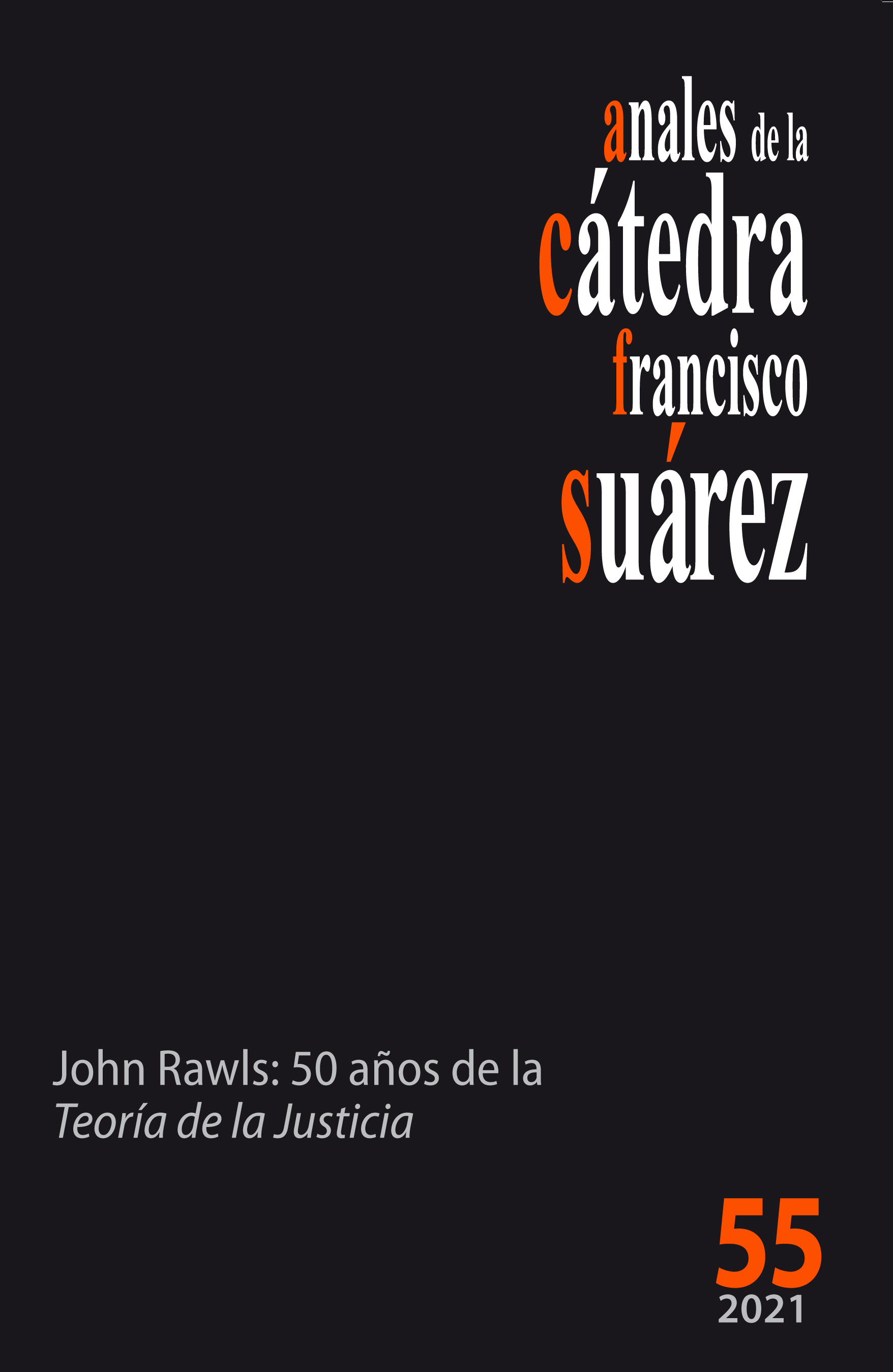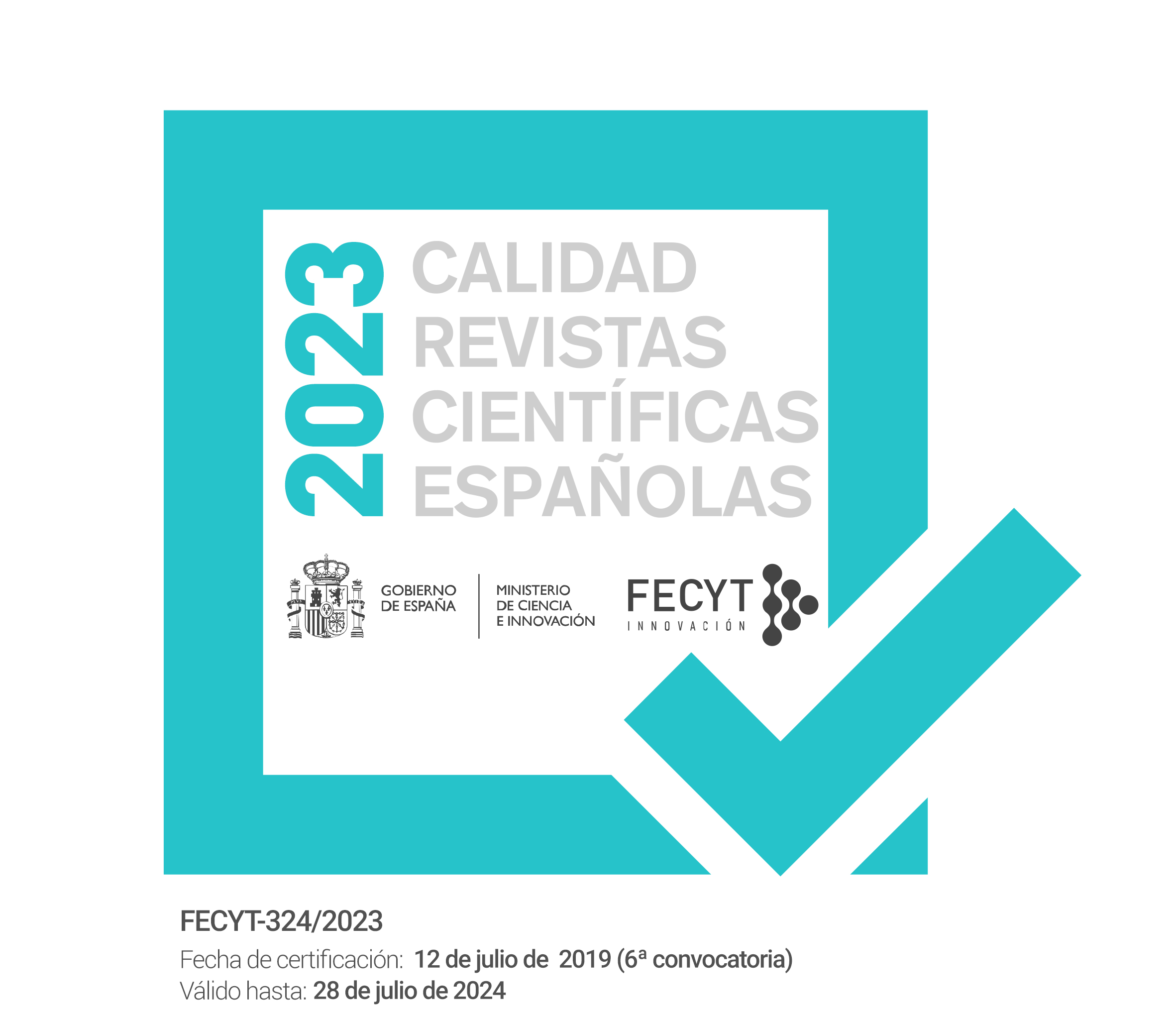Rawls, el derecho y el hecho del pluralismo
DOI:
https://doi.org/10.30827/acfs.v55i0.15467Palabras clave:
John Rawls, Ronald Dworkin, razonamiento jurídico, razón pública, principios de nivel medio.Resumen
RESUMEN
En este trabajo se analizan las principales ideas de John Rawls acerca de la naturaleza del derecho y del razonamiento jurídico. Partiendo de un trabajo de Ronald Dworkin (2004), y básicamente de acuerdo con él, se exponen las críticas dworkinianas a la doctrina rawlsiana de la razón pública, y se presenta un modo en el cual Rawls podría replicarlas. El objetivo del trabajo es mostrar la fecundidad de las ideas rawlsianas para nuestra concepción del derecho en sociedades democráticas, caracterizadas por el hecho del pluralismo.
Descargas
Citas
ACKERMAN, Bruce (1993): We the People. Vol 1. Foundations. Cambridge, Mass.. Harvard University Pres.
ATIENZA, Manuel, RUIZ MANERO, Juan (1996): Las piezas del derecho. Barcelona: Airel.
AUDI, Robert (2004): The Good and the Right. A Theory of Intuition and Intrinsic Value. Princeton: Princeton University Press.
BAYLES, M. D. (1986). “Mid-level Principles and Justification”. Nomos 28: 49-67.
BEAUCHAMP, TOM L.; CHILDRESS, James F. (1989): Principles of Biomedical Ethics, fourth edition. Oxford: Oxford University Press.
--- (2013): Principles of Biomedical Ethics, seventh edition. Oxford: Oxford University Press.
BOBBIO, Norberto (1965): Giusnaturalismo e positivismo giuridico. Milán: Communità.
BRANDT, Richard (1990): “The Science of Man and Wide Reflective Equilibrium”, Ethics, 100: 259–278.
BULYGIN, Eugenio (2015): Essays in Legal Philosophy. C. Bernal, C. Huerta, T. Mazzarese, J.J. Moreso, P.E. Navarro and S. Paulson, (eds.). Oxford: Oxford University Press).
CALSAMIGLIA, Albert (1984): 'Ensayo sobre Dworkin'. En Ronald Dworkin, Los derechos en serio, trad. de Marta Gustavino. Barcelona: Ariel, pp. 7-29.
CELANO, Bruno (2009): Derecho, justicia, razones. Ensayos 2000-2007, trad. del italiano y del inglés por F. Laporta y A. Greppi. Madrid: Centro de Estudios Constitucionales.
COHEN, Gerald (2008): Rescuing Justice and Equality. Cambridge, Mass.: Harvard University Press.
DANIELS, Norman (1996): Justice and Justification: Reflective Equilibrium in Theory and Practice, (Cambridge: Cambridge University Press).
– (2016): “Reflective Equilibrium”, The Stanford Encyclopedia of Philosophy (Winter 2016 Edition), Edward N. Zalta (ed.), URL = <https://plato.stanford.edu/archives/win2016/entries/reflective-equilibrium/>.
DÍAZ, Elías (1971): Sociología y filosofía del derecho. Madrid: Taurus.
DWORKIN, Ronald (1977): Taking Rights Seriously. Londres: Duckworth.
– (1986): Law”s Empire. Cambridge: Mass.: Harvard University Press.
– (1993): Life”s Dominion. An Argument about Abortion, Euthanasia, and Individual Freedom. Londres: Harper Collins.
– (1996): “Objectivity and Truth: You”d Better Believe It”. Philosophy and Public Affairs, 25: 97-139.
– (1997): “In Praise of Theory”. Arizona State Law Journal. 27: 353-376 (ahora en Ronald Dworkin (2006): cap. 2).
– (2000): “Equality and the Good”. En R. Dworkin, Sovereign Virtue. The Theory and Practice of Equality. Cambridge, Mass: Harvard University Press, cap. 6.
– (2004): “Keynote Address: Rawls and the Law”. Fordham Law Review, 72:1387-1405 (ahora en Ronald Dworkin (2006): cap. 9).
– (2006): Justice in Robes. Cambridge: Mass.: Harvard University Press.
– (2011): Justice for Hedgehogs. Cambridge: Mass.: Harvard University Press.
DWORKIN, Ronald et al. (1997): “Assited Suicide: The Philosopher”s Brief”. New York Review of Books, Marzo 27.
FINNIS, John (1973): “The Rights and Wrongs of Abortion: A Reply to Judith Thomson” Philosophy and Public Affairs. 2, 117-145.
FLANDERS, Chad (2016): “Criminals behind the Veil: Political Philosophy and Punishment”, Brigham Young University Journal of Public Law, 31: 83-108.
FØLLESDAL, Andreas (2002): “Rawls in the Nordic Countries”. European Journal of Political Theory, 1(2), 181–198.
FOOT, Philippa (1967). “The problema of Abortion and the Doctrine of Double Effect”. Oxford Review, 5, 1-7.
GARZÓN VALDÉS, Ernesto (1993): Derecho, ética y política. Madrid: Centro de Estudios Constitucionales.
GREENBERG, Mark (2015): “The Moral Impact Theory of Law”. The Yale Law Journal, 123: 1288-1314.
GUASTINI, Riccardo (1996): Distinguendo. Turín: Giappichelli.
HABERMAS, Jürgen (1995): “Reconciliation through the Public Use of Reason: Remarks on John Rawls”s Political Liberalism”. The Journal of Philosophy, 92: 109-131.
HÄGERSTRÖM, Axel (1953): Inquiry into Nature of Law and Morals. Edited by Karl Olivecrona, and translated by C. D. Broad. Stockholm: Almquist & Wiksell.
HARE, Richard M. (1973): “Rawls' Theory of Justice”, Philosophical Quarterly, 23: 144–55; 241–51.
HART, H.L.A. (1961): The Concept of Law. Oxford: Oxford University Press.
– (1968). Punishment and Responsibility. Oxford: Oxford University Press.
– (1975): “Rawls on Liberty and its Priority”. En Norman Daniels (ed.), Reading Rawls. Critical Studies of A Theory of Justice. Oxford: Basil Blackwell, 230-252.
HERNÁNDEZ MARÍN, Rafael (1986): Historia de la filosofía del derecho contemporánea. Madrid: Tecnos.
HENLEY, Kenneth (1993): “Abstract Principles, Mid-Level Principles, and the Rule of Law”. Law and Philosophy 12: 121-132.
JACOBS, Laverne (2014): “From Rawls to Habermas: Towards A Theory of Grounded Impartiality in Canadian Administrative Law”. Osgoode Hall Law Journal 51: 543-594.
KAMM, F. M. (1997): “Theory and Analogy in Law”. Arizona State Law Journal, 29: 405-426.
– (2002): Creation and Abortion: A Study in Moral and Legal Philosophy. Oxford: Oxford University Press.
KANT, Immanuel (1797/1989): Metafísica de las costumbres, trad. de A. Cortina y J. Conill. Madrid: Tecnos.
KELLY, Thomas, MCGRATH, Sara (2010): “Is Reflective Equilibrium Enough?” Philosophical Perspectives, 24: 325–359.
KELSEN, Hans (1960) Reine Recthslehre 2nd ed. Viena: Franz Deuticke.
LEITER, Brian (2004-5): “The End of Empire: Dworkin and Jurisprudence in the 21st Century”,. Rutgers Law Journal, 36: 165-182.
LAPORTA, Francisco J. (1993): Entre el Derecho y la Moral. México: Fontamara.
LUNDSTEDT, A. Vilhelm (1956): Legal Thinking Revised. Estocolmo: Almqvist and Wiksell.
MCINTYRE, Alyson (2019): “Doctrine of Double Effect”. The Stanford Encyclopedia of Philosophy (Spring 2019 Edition), Edward N. Zalta (ed.), forthcoming URL = <https://plato.stanford.edu/archives/spr2019/entries/double-effect/>.
MCPHERSON, Tristram; PLUNKETT, David, eds. (2018): The Routledge Handbook of Metaethics. London. Routledge.
MICHELMAN, Fran I. (2002): “Rawls on Constitutionalism and Constitutional Law”. En Samuel Freeman (ed.), The Cambridge Companion to Rawls. Cambridge: Cambridge University Press, 394-425.
MORESO, J.J. (1992): La teoría del Derecho de Bentham. Barcelona: PPU.
– (2009): “A modo de prólogo: Celano y la fragilidad del conocimiento práctico”. En Celano (2009), 9-16.
NAGEL, Thomas (1986): The View from Nowhere. Oxford: Oxford University Press.
NINO, Carlos S. (1989): Ética y derechos humanos. Buenos Aires: Astrea, 1989.
OBERDIEK, John (2016): “Structure and Justification in Contractualist Tort Theory”. En John Oberdiek (ed.), Philosophical Foundations of the Law of Torts. Oxford: Oxford University Press, 2005.
OKIN, Susan Moller (2004): “Justice and Gender: An Unfinished Debate”. Fordham Law Review. 72: 1537-1568.
OLIVECRONA, Karl (1940): England eller Tyskland. Lund: C. W. K. Gleerup, 1940.
– (1941): Europa och Amerika. Lund: Sundqvist & Emond.
PARFIT, Derek (2011): On What Matters. Volume One and Two. Oxford: Oxford University Press.
– (2017): On What Matters. Volume Three. Oxford: Oxford University Press.
RAWLS, John (1951): “Review of An Examination of the Place of Reason in Ethics by Stephen Edelston Toulmin”. The Philosophical Review, 60: 572-580.
– (1955): “Review of Inquiry into Nature of Law and Morals by Axel Hägerström”. Mind, 64: 421-422.
– (1958-1959): “Review of Legal Thinking Revised by A. Vilhelm Lundsted”. Cornell Law Quarterly, 44: 169-171.
– (1971): A Theory of Justice, Cambridge, Mass.: Harvard University Press.
– (1974): “The Independence of Moral Theory”, Proceedings and Addresses of the American Philosophical Association, 47: 5–22.
– (1980): “Kantian Constructivism in Moral Theory”. Kantian Constructivism in Moral Theory”. The Journal of Philosophy, 77: 515-572.
– (1987): “The Idea of Overlapping Consensus”, Oxford Journal of Legal Studies. 7: 1-25.
– (1989): “The Dominion of the Political and Overlapping Consensus”. New York University Law Review. 64: 233-255.
– (1993): Political Liberalism. Nueva York: Columbia University Press.
– (1995): “Political Liberalism: Reply to Habermas”, The Journal of Philosophy. 92: 132-180.
– (1996): Political Liberalism, Paperback edition. New York: Columbia University Press.
– (1997): “The Idea of Public Reason Revisited”, The University of Chicago Law Review. 64: 765-807.
– (1998): “An Interview with John Rawls”. Commonweal, September 25. https://www.commonwealmagazine.org/interview-john-rawls
– (1999): A Theory of Justice, 2nd edition. Cambridge, Mass.: Harvard University Press.
– (2000): Lectures on the History of Moral Philosophy. Cambridge, Mass.: Harvard University Press.
– (2001): Justice as Fairness: A Restatement. Cambridge Mass.: Harvard University Press.
RAZ, Joseph (1979): The Authority of Law. Oxford: Oxford University Press.
– (1994): Ethics in the Public Domain. Oxford: Oxford University Press.
RODILLA, Miguel Ángel (1986): La teoría de la justicia de John Rawls. Una presentación”. En: John Rawls, Justicia como equidad. Materiales para una teoría de la justicia. Madrid: Tecnos.
ROSS, Alf (1958): On Law and Justice. London: Stevens and Sons.
ROSS, David (1930): The Right and the Good. Oxford: Oxford University Press.
– (1939): The Foundations of Ethics. Oxford: Oxford University Press.
SCANLON, T.M. (2003): “Rawls on Justification”, en Samuel Freeman (ed.), The Cambridge Companion to Rawls. Cambridge: Cambridge University Press, ch. 3.
– (2014): Being Realistic About Reasons. Oxford: Oxford University Press.
SHIFFRIN, Seana Valentine (2003): “Speech, Death, and the Fair Equality of Opportunity Principle”. New York University Law Review. 78: 1135-1185.
– (2004): “Race, Labor, and the Fair Equality of Opportunity Principle”. Fordham Law Review. 72: 1643-1676.
SIDGWICK, Henry (1909): Practical Ethics (Londres: Swan Sonnenschein & Co.).
SINGER, Peter (2016) (ed.): Does Anything Really Matter? Essays on Parfit and Objectivity. Oxford: Oxford University Press.
SOLUM, Lawrence (2004): “Procedural Justice”. Southern California Law Review. 78: 181-321.
SPAAK, Torben (2014): A Critical Appraisal of Karl Olivecrona's Legal Philosophy. Frankfurt: Springer, 2014.
SUGIN, Linda. (2004): “Theories of Distributive Justice and Limitations on Taxation: What Rawls Demands from Tax Systems”. Fordham Law Review, 72: 1991-2014.
SUNSTEIN, Cass (1995): 'Incompletely Theorized Agreements'. Harvard Law Review, 108: 1733-1772.
– (1996): Legal Reasoning and Political Conflict. Oxford: Oxford University Press.
– (1997): “From Theory to Practice”. Arizona State Law Journal, 29: 389-404.
TERESA DE JESÚS. Las Moradas. Alicante: Biblioteca Virtual Miguel de Cervantes, 2000. http://www.cervantesvirtual.com/obra-visor/las-moradas--0/html/
TESÓN, Fernando R. (2006): “The Rawlsian Theory of International Law”. Ethics & International Affairs, 9: 79-99.
TOULMIN, Stephen E. (1950): An Examination of the Place of Reason in Ethics. Cambridge: Cambridge University Press.
Descargas
Publicado
Cómo citar
Número
Sección
Licencia
Los nombres y direcciones de correo-e introducidos en esta revista se usarán exclusivamente para los fines declarados por esta revista y no estarán disponibles para ningún otro propósito u otra persona.
Los autores y autoras poseen los derechos sobre sus trabajos. Los ACFS ruegan que se haga constar la publicación en los mismos si aparecieran con posterioridad en otro medio.

















